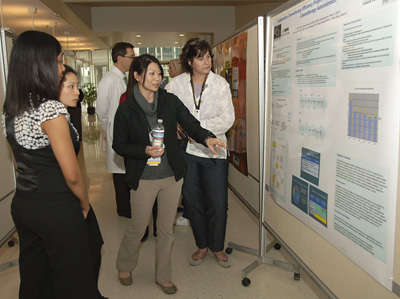
The health system's first "Integrating Quality" symposium included poster presentations of research highlighting best practice initiatives and innovations in quality and safety.
Posted June 8, 2011
First-year pediatric resident Yuan-Jiun Nicole Chao was frustrated by data showing that half the children hospitalized for asthma are discharged home without any care plan to help them and their families, monitor their asthma symptoms for both quick-relief and long-term control.
While she knew that deaths from the disease are rare, Chao felt that many repeat hospitalizations for asthma could be prevented simply by appropriate planning and follow-up care at hospital discharge. How, she wondered, could hospitals ensure that their care teams provided asthma home management plans at discharge? How would patients get helpful instructions for self-monitoring symptoms and effectively using long-term control and quick-relief medications?
“It’s a fairly simple, quality-care improvement strategy that could pay big dividends,” said Chao. “We know we can reduce repeated hospitalizations for children with asthma by making sure they are discharged with a home-care plan that gives them the tools to better manage their disease.”
To ensure that physicians remember to provide asthma-care plans upon discharge, for example, Chao introduced visual prompts in the form of posters in clinical workrooms as a reminder about asthma management plans for children and their families. She also enlisted administrative support to review hospital discharge records and sent letters to attending physicians whose discharges did not include providing the plans.
Integrating quality improvement at every level
 “This first annual symposium brought together all of the components of our integrated health system to make a strong statement about our commitment to continuous quality improvement, using our shared values of collaboration and teamwork.”
“This first annual symposium brought together all of the components of our integrated health system to make a strong statement about our commitment to continuous quality improvement, using our shared values of collaboration and teamwork.”
— Fred Meyers
Chao shared her insights during the recent symposium, "Integrating Quality: Linking Clinical and Educational Excellence at UC Davis Health System." About 75 medical, nursing and pharmacy students, resident physicians, School of Medicine faculty, nurses, researchers and academic staff attended the day-long event on UC Davis’ Sacramento campus, which featured a number of speakers and information to help launch a new health system program aimed at integrating more trainees and faculty members into quality improvement work.
The inaugural event showcased best practice initiatives and highlighted innovations in quality and safety that are being integrated into training and education programs at every level of the organization. The symposium reflects a national effort to ensure that health-care delivery is safe, effective, patient-centered, timely, efficient and equitable.
“This first annual symposium brought together all of the components of our integrated health system to make a strong statement about our commitment to continuous quality improvement, using our shared values of collaboration and teamwork,” said Fred Meyers, who initiated the event and is UC Davis School of Medicine’s executive associate dean.
“Lifelong learning, because it translates so well into improving quality of care and population health, not only links us to the communities we serve, but also ensures the promise we make of ourselves to provide the best in safe and effective patient care.”
Embracing innovation, improving patient care
The movement for quality improvement in health care was prompted more than a decade ago by an Institute of Medicine publication, “To Err is Human,” which reported that up to 98,000 patients died each year due to medical errors — some mistakes being as basic as forgetting about routine hand washing hygiene or not being able to correctly read a medication order because of a illegible handwriting.
 “We are one of only a few health-care institutions in the nation that have made integrating quality improvement in health education and clinical programs such a major priority.”
“We are one of only a few health-care institutions in the nation that have made integrating quality improvement in health education and clinical programs such a major priority.”
— Ulfat Shaikh
The report was a catalyst for numerous initiatives at health-care institutions and within professional medical societies to systematically improve the quality of health-care delivery.
According to Ulfat Shaikh, associate professor of pediatrics and one of the key organizers of the symposium, the emphasis on quality improvement at UC Davis Health System is exciting and innovative because administrative leaders are committed to making systemwide changes, including at the level of training and education for health professionals.
“We are one of only a few health-care institutions in the nation that have made integrating quality improvement in health education and clinical programs such a major priority,” said Shaikh, who gave a plenary talk at the symposium. “The symposium, which will be held annually, is a significant event because it clearly communicates how UC Davis, as an institution, embraces quality improvement innovations in every aspect of patient care.”
Students, as well as faculty and other health system employees, were impressed by the event because of its wide range of topics and speakers, many of whom provided specific examples to illustrate new approaches to ensuring continuous quality improvements within the clinical setting.
“The symposium was a really useful experience,” said Lily Cheng, a third-year medical student who presented research about pulmonary embolisms and deep-vein thromboses cases at UC Davis Medical Center. “It was an eye-opener for me that even small things that we can change consistently in the practice of medicine can have real benefits for preventing deaths and reducing complication rates.”